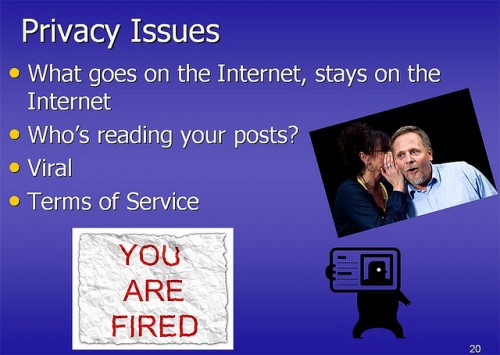The Top Misconceptions about Privacy at Work

Bloggers and social network users alike are well-advised to be mindful about what they post to the Internet regarding their jobs, companies, or co-workers.
Most of us go about our day-to-day business probably not thinking much about the right to privacy at work. We understand, on some level, that employers are legally entitled to monitor our communications on work-owned equipment. Generally speaking, though, that fact doesn’t have a huge impact on us until some serious, work-related incident arises wherein an employer demonstrates how much latitude they’re legally granted to monitor what employees do at work. This post is designed to help you avoid such incidents – and such unwelcome surprises – by helping you understand your privacy rights at work and exactly how far employers can go in monitoring your activities on the job. What might surprise you most is that in some states, employers can go beyond the monitoring of work-related activities and intrude into the personal lives of workers as well.
Check Your Privacy at the Door
You may not realize it, but in most of the U.S., laws regarding the right to privacy at work favor the employer. The minute you accept a job, the moment you walk through the office door each day, you relinquish a certain degree of privacy to the employer. Of course, you don’t relinquish ALL of your privacy rights at work, but for instance, did you know that under the right circumstances, an employer might have the right to search your personal belongings? It’s true. If something of great value is stolen during the work day, depending on the state and the employer’s written privacy policies, said employer might be legally allowed to search each employee’s personal belongings before they leave the office for the day. Employers are also allowed, to a limited degree – again, depending on the state and a business’ pre-existing privacy policies – to install cameras in the workplace if a genuine, business-related need for such surveillance exists.
It’s Their (Virtual) World
Of course, the aforementioned examples are extreme cases. These days, when most people think of work-related privacy issues, they almost always think of work computer privacy and Internet privacy at work. If you’re reading this post at work, I certainly hope your employer is aware and doesn’t object. When it comes to work computer privacy, the expectation for confidentiality is pretty simple: Unless otherwise spelled out by the employer, there is none. Employers are, generally speaking, allowed to access and read any email communication you send or receive not only from your work-related account but also from any personal account if you access it from a work-owned computer. What may surprise some readers, however, is the fact that the right to read and access those accounts also extends to draft emails – communications you might never intend to send. What makes that a dicey proposition for the employee is the fact that we all say things we don’t really mean or don’t intend to send in a draft – that’s what makes it a draft. Basically, then, if you write an email from a work-related account or on a personal account on a work-related computer, be it sent or merely a draft, you have no realistic expectation for privacy under the law.
The Facebook Factor
Just about everyone these days knows employers are legally allowed to track employee Internet habits and that workers have little expectation of Internet privacy at work. SoftActivity’s primary product line, in fact, is designed to help employers do just that. Activity Monitor software, for example, is an excellent way to know not only what sites employees visit but also exactly what types of searches are being done at each site, what types of information are being exchanged, and what types of communication are taking place and between whom. Here’s something you might not know, though: In many states across the nation, employers are legally allowed to demand the usernames and passwords of social media accounts of their employees and then peruse those accounts. Additionally, employers in these same states are allowed to appropriate the social media usernames and passwords of prospective employees as part of the interviewing/hiring process. The good news? As of this writing, 11 states have passed laws banning the practice and another 28 are considering legislation that would outlaw it. For now, though, with the laws being uneven from state to state, the best practice is to be extremely mindful regarding every bit of information – public or private – you post to Facebook and other social networking sites.
Blogger Beware
Speaking of public Facebook posts, as of this writing, no state has or is considering laws to prevent employers from monitoring the public social media posts or blog posts of their employees. Hate your boss? Think your company is the devil incarnate for its international business practices? Hate your job in general and the people with whom you work? You’d better be careful how you express those sentiments on your blog or through your public Facebook posts. Although there are laws to protect a person’s right to express themselves, freedom of speech only goes so far when it comes to private companies; you could find yourself in hot water at work for something posted on the Internet.
Read more in our employee monitoring guide
By SoftActivity Team
Photo by Eva Abreu (Flickr)